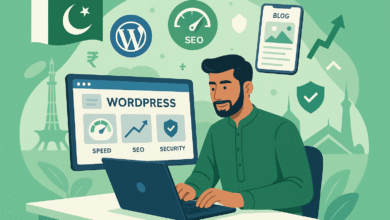How to Improve Brand Visibility Using Offline SEO Strategies
Learn effective offline SEO strategies to boost your brand visibility, build authority, and improve search rankings. Discover link building, citations, and local tactics.

When you think about getting your business to show up in Google search results, you might only think about what happens on your website.
But here’s the truth: some of the most powerful ways to improve your brand visibility happen outside of your website. These are called offline SEO strategies, and they work together with your website to help search engines understand that your business is real, trustworthy, and worth showing to people who are searching for what you offer.
In this guide, we’ll walk you through proven offline SEO strategies that will help you build authority, get better search rankings, and reach more customers. Whether you run a small local business or a larger company, these tactics can make a real difference in how visible your brand becomes online.
What Are Offline SEO Strategies?
Offline SEO strategies (sometimes called off-page SEO) are all the things you do outside your website to help it rank better in search results. Think of it like this: your website is your digital storefront, but offline SEO strategies are like the word-of-mouth reputation your business has in your community. When people recommend your business to others, when your name appears in local directories, when other websites mention your company, and when people leave positive reviews, all of these things tell Google that your business is legitimate and trustworthy.
The main difference between offline SEO and on-page SEO is simple. On-page SEO happens on your website, like writing good content and using keywords. But offline SEO tactics happen everywhere else online and even in the real world. They help build your brand’s reputation and authority so search engines will rank you higher.
Why Offline SEO Strategies Matter for Your Business
You might wonder why offline SEO strategies matter if you already have a good website. Here’s why: Google’s algorithm has changed a lot over the years. These days, Google looks at more than just what’s on your website. It looks at what other people are saying about you all across the internet.
Search engines use something called E-E-A-T to decide if websites are worth ranking. E-E-A-T stands for Experience, Expertise, Authoritativeness, and Trustworthiness. Offline SEO strategies help you build all of these things. When your business is mentioned on reputable websites, when people leave good reviews, when you appear in business directories with your correct information, and when you build relationships with influential people in your industry, Google sees that as proof that you’re a real, trustworthy business.
Without strong offline SEO tactics, even a great website will struggle to rank well. But when you combine good on-page content with solid offline SEO strategies, your rankings can improve significantly.
The Main Offline SEO Strategies That Work
1. Build High-Quality Backlinks
Backlinks are probably the most important part of offline SEO strategies. A backlink is simply a link from another website to your website. When reputable websites link to you, it’s like getting a vote of confidence from them.
Not all backlinks are created equal, though. One link from a big, trusted website in your industry is worth way more than ten links from small, unknown websites. Google pays attention to the quality and relevance of backlinks, not just how many you have.
Here are ways to build quality backlinks as part of your offline SEO strategies:
- Create really good content that people actually want to link to
- Reach out to websites in your industry and ask them to link to your content
- Write guest posts for other blogs in your field
- Get involved in your industry and build relationships with other business owners
- Look for broken links on other websites and offer your content as a replacement
- Create helpful tools, guides, or resources that other sites will naturally want to link to
2. Get Business Citations and Directory Listings
A citation is simply a mention of your business name, address, and phone number (often called NAP) on websites like Google Business Profile, Yelp, and other local directories.
Citations are one of the most underrated parts of offline SEO strategies, but they matter a lot. When your business appears in lots of reputable directories with the same, accurate information, it tells Google that your business is real and legitimate. This is especially important if you’re a local business trying to rank in your area.
What you need to do for citations:
- Make sure your business is listed on Google Business Profile with accurate information
- Add your business to Bing Places for Business
- Get listed on industry-specific directories related to your business
- Check directories like Yelp, Yellow Pages, and other platforms where your customers might search
- Keep your NAP information the same everywhere (consistency is really important)
- Make sure your business hours and services are correct on all listings
3. Encourage and Manage Online Reviews
People trust other people more than they trust companies. That’s why reviews are such a powerful part of offline SEO strategies. Positive reviews help you in two ways. First, they convince potential customers to choose your business. Second, they send signals to Google that your business is popular and trustworthy.
Google, Bing, and other search engines now look at reviews as a ranking factor. The more good reviews you have, the better your chances of ranking higher.
Here’s what to do with reviews as part of your offline SEO strategies:
- Ask your happy customers to leave reviews on Google, Yelp, and other review sites
- Make it easy for customers to leave reviews (provide links in emails and on your website)
- Respond to all reviews, both positive and negative, in a professional way
- Fix any problems customers mention in negative reviews
- Show potential customers that you care about feedback
- Never buy fake reviews or do anything dishonest (search engines can tell and it will hurt you)
4. Use Social Media to Support Your SEO
While social media likes and shares don’t directly affect your Google rankings, they definitely help your offline SEO strategies work better. When you share content on social media and it gets shared a lot, more people see it. More visibility means more chances for people to link to your content, mention your brand, and visit your website.
Social media also helps build brand awareness, which leads to more branded searches. When people search for your company name specifically, it tells Google that your brand is popular and worth ranking.
Ways to use social media as part of offline SEO strategies:
- Share your best content regularly on all your social media platforms
- Engage with your audience by responding to comments and messages
- Share content from industry experts and thought leaders in your field
- Build relationships with influencers and other businesses in your industry
- Join groups and communities where your customers spend time online
- Make it easy for people to share your content
5. Guest Posting and Content Marketing
Writing guest posts on other websites is one of the best offline SEO strategies for building authority. When you write a good article for another website in your industry, a few things happen. You get a backlink to your site, you reach new people who might become customers, and you get to show your expertise to a new audience.
Content marketing goes hand in hand with offline SEO strategies. When you create really good content (blog posts, guides, videos, infographics), other websites will naturally want to link to it and share it. This is one of the best ways to build a strong backlink profile without having to ask people for links.
Good content marketing strategies for offline SEO tactics:
- Create long, detailed guides that answer questions people are actually searching for
- Make data-driven content (infographics, research reports, studies)
- Create tools or calculators that people find useful
- Write case studies that show real results you’ve achieved for clients
- Update old content to keep it current and relevant
- Create content that solves specific problems your customers have
6. Local SEO and Community Involvement
For local businesses, offline SEO strategies need to include a strong local SEO plan. This means making sure your business shows up when people search for your products or services in your area.
Being active in your community is actually a great offline SEO strategy. When you sponsor local events, participate in community organizations, or get mentioned in local news, it builds your local authority. People in your area will search for your business more, and local websites will link to and mention your business.
Local SEO and community strategies:
- Get involved in local nonprofits and community organizations
- Sponsor local events or sports teams
- Host events or workshops in your community
- Get mentioned in local news and press
- Build relationships with other local businesses
- Make sure your website mentions your location and local keywords
7. PR and Press Releases
Public relations (PR) is a powerful offline SEO strategy that many people overlook. When you create newsworthy content and distribute it through press releases, journalists might write about your company. Articles in reputable news outlets and industry publications give you high-quality backlinks and brand mentions that really boost your authority.
One good mention in a major publication can do more for your SEO than months of other tactics. News sites have really high domain authority, which means links from them are super valuable.
How to use PR as part of offline SEO strategies:
- Create interesting, newsworthy content or announcements
- Write press releases about important company news, new products, or interesting research
- Distribute your press releases to journalists and media outlets
- Pitch story ideas to journalists in your industry
- Build relationships with reporters who cover your industry
- Create data or research that journalists want to cover
8. Build Industry Relationships and Partnerships
Strong relationships with other businesses and influencers in your industry are a key part of offline SEO strategies. When you build these relationships, good things happen. People link to your site, mention your brand, share your content, and collaborate with you in ways that help your SEO.
Relationships also lead to speaking opportunities, podcast interviews, and feature articles, all of which give you valuable backlinks and brand mentions.
Building relationships as an offline SEO strategy:
- Attend industry conferences and networking events
- Connect with influential people on social media and via email
- Collaborate with other businesses on content or projects
- Participate in industry groups and forums
- Comment thoughtfully on other industry leaders’ content
- Offer value to others before asking for anything in return
How to Measure Your Offline SEO Success
You need to know if your offline SEO strategies are actually working. Here are the main things to track:
Search Rankings – Use tools to track your ranking position for important keywords. This is your biggest indicator of SEO success.
Backlink Profile – Use SEO tools to see how many backlinks you have and where they’re coming from. More quality backlinks usually mean better rankings.
Website Traffic – Check how much organic traffic you’re getting from search engines using Google Analytics.
Brand Mentions – Set up Google Alerts for your business name to see where you’re being mentioned online.
Local Visibility – For local businesses, check how you’re showing up in Google Maps and local search results.
Reviews and Ratings – Track the number and quality of reviews you’re getting on different platforms.
Common Mistakes With Offline SEO Strategies
When using offline SEO strategies, try to avoid these mistakes:
- Buying fake backlinks or reviews (search engines can tell and will penalize you)
- Using the same backlink anchor text over and over (variety looks more natural)
- Getting backlinks too quickly (it should happen gradually and naturally)
- Ignoring backlink quality in favor of quantity
- Not keeping your business information consistent across all directories
- Forgetting to respond to reviews
- Only focusing on offline SEO strategies and ignoring on-page SEO
- Not tracking your progress
The Best Resources for Learning More
If you want to learn more about offline SEO strategies, check out these authoritative resources:
- Google Search Central – Google’s official SEO Starter Guide explains how search engines work and best practices for SEO, including offline tactics.
- Backlinko’s Off-Page SEO Guide – Backlinko’s comprehensive guide covers advanced offline SEO strategies and includes real case studies showing how these tactics work.
Key Takeaways for Your Offline SEO Strategy
Here’s what you need to remember about offline SEO strategies: First, build high-quality backlinks from reputable websites in your industry. Second, make sure your business information is consistent across all online directories. Third, encourage customers to leave positive reviews. Fourth, use social media smartly to increase visibility and shares. Fifth, create really good content that people want to link to and share. Sixth, build real relationships with other businesses and influencers. Seventh, use PR and press releases to get mentions in reputable publications. Finally, combine all of these offline SEO strategies with good on-page SEO and technical SEO for the best results.
Conclusion
Improving your brand visibility isn’t just about having a good website anymore. Offline SEO strategies are now essential for any business that wants to rank well in Google, Bing, Yahoo, and other search engines.
By building high-quality backlinks, getting listed in business directories, encouraging reviews, leveraging social media, creating great content, building industry relationships, and using PR effectively, you can significantly improve your search rankings and reach more customers.
Remember that SEO takes time, and these offline SEO strategies work best when you combine them with solid on-page optimization.
Start with one or two strategies that fit your business, get comfortable with them, and then add more over time. The businesses that succeed with SEO are the ones that take a complete approach and are willing to put in consistent effort across all channels.











